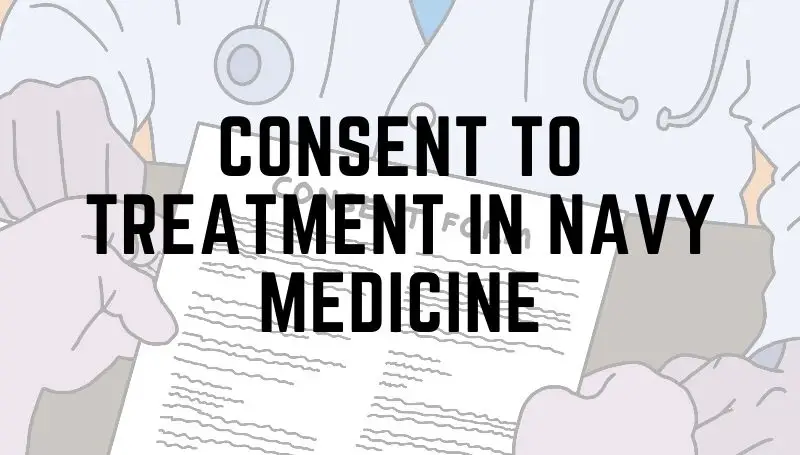Everyone has the right not to be touched. So consent must be given before medical treatment is performed. If not, the provider might be in trouble for malpractice, assault, and battery.
What is the Navy’s definition of informed consent?
If a person gives consent, it means that this person is expressed or implied and agreed to submit to treatment.
Informed consent requires that the provider gives the patient all the information they need to make a knowledgeable decision.
Lawful consent means that the patient can make a knowledgeable decision and is fully aware of the consequences. The procedure must be made easy to understand including details about the nature of the treatment, the risks, and if there are any alternative options.
What’s really important is the duty to inform and explain all of this is the responsibility of the provider alone. This means that the provider can’t delegate this job to anyone else.
For all other simple procedures and treatments that are considered risk-free, a provider is not required to explain the consequences.
Usually, the one to determine what’s simple and what’s not is made according to the perspective of appropriate medical standards.
What happens to consent during an emergency situation in Navy Medicine?
During an emergency situation when time is critical to a patient’s condition, consent before treatment is not necessary. This would pertain to life-threatening situations when it’s not possible to get valid consent from the patient.
Perform the treatment and make sure full documentation is recorded. If a provider were to face the situation, he or she would be expected to ask him or herself what a “reasonable person would expect” and following that guiding principle to treat.
Who may consent for medical treatment in the Navy
Determining who can give consent is based on the competency of the patient.
If the patient is competent then the decision is their’s alone. This would mean that the patient has the ability to understand the nature and consequences of their decisions.
If the patient is incompetent then the decision must be turned over to whoever has the legal capacity to make decisions on the patient’s behalf. Incompetency can either be reasons for statutory incompetence like being a minor or other reasons like physical or mental impairment. Parents and guardians have the authority to consent for their minor children. And in many states, a husband or wife may give consent to an incompetent spouse.
Ultimately it is the law of the state that the treatment is being performed in that controls the question of who has the authority to make a legal consent on behalf of someone else. This is known often as “substitute consent.”
In other situations, there may be paperwork known as an advance directive. This is paperwork that indicates who can provide informed consent for a patient. This can include:
- A healthcare surrogate designation
- A healthcare power of attorney
- A general power of attorney
This form is kept in the patient’s profile in the electronic health record (like CHCS or AHLTA) for quick retrieval when needed.
What are other forms of consent in Navy Medicine?
Any type of consent is usually obtained through open discussion between the provider and the patient. The patient has to expressively agree to the procedure. It is appropriate to have documentation signed in agreeance with procedures.
In some circumstances, there will be something called implied consent. Implied consent is usually seen when the patient infers. An example given here is when it’s time to draw blood, and the patient rolls up his or her own sleeves. It’s implied consent. However, relying on this form of consent is usually discouraged unless it’s one of the most routine procedures that almost always happens like getting someone’s weight.
What is witness to consent in the Navy?
There is also one thing called a witness to consent. It is when a competent adult actually sees the patient consent to the procedure.
This adult cannot be a staff member who is taking a role in the procedure because that would be a conflict of interest.
However, it is allowed to have a staff member who is not participating in the procedure.
It is also not advisable for the patient’s relative to act as a witness either.
What are the rules for the duration of consent in the Navy?
As long as there are no changes in the circumstances between the date the consent was given and the date of the procedure, then consent is valid.
New consent is recommended if there is a significant time lapse or if the patient has been discharged and readmitted due to a postponement of the procedure. This is however up to the command’s policy.

